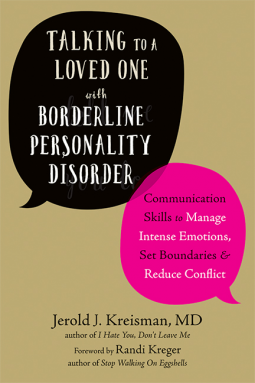
Talking to a Loved One with Borderline Personality Disorder
Communication Skills to Manage Intense Emotions, Set Boundaries, Reduce Conflict
by Jerold J Kreisman; Randi Kreger
This title was previously available on NetGalley and is now archived.
Send NetGalley books directly to your Kindle or Kindle app
1
To read on a Kindle or Kindle app, please add kindle@netgalley.com as an approved email address to receive files in your Amazon account. Click here for step-by-step instructions.
2
Also find your Kindle email address within your Amazon account, and enter it here.
Pub Date Dec 27 2018 | Archive Date Jan 16 2019
New Harbinger Publications, Inc. | New Harbinger
Talking about this book? Use #TalkingToAlovedOneWithBorderlinePersonalityDisorder #NetGalley. More hashtag tips!
Description
In this compassionate guide, Jerold Kriesman-author of I Hate You, Don't Leave Me-offers a powerful set of tools to help you express yourself, set boundaries, and cultivate healthy communication with a loved one who is diagnosed with borderline personality disorder (BPD).
If you have a loved one with BPD, you need real, proven-effective strategies to help you navigate the intense emotions and conflict that can arise in daily interactions and conversations. People with BPD often feel anger, pain, and hurt from a history of invalidation and disappointment, and their difficulty in regulating emotions can lead to moments of lashing out that can confuse and upset those around them.
Written by a psychiatrist with more than 40 years of experience in treating BPD, I Hate You, Tell Me You Love Me offers a breakthrough, compassionate approach to communicating with a loved one who has BPD. The SET (support, empathy, truth) method outlined in this book is a powerful and simple tool that will allow you to honestly address your loved one's demands, assertions, and feelings while still maintaining appropriate boundaries. Each step builds on the last, helping you build up a consistent and reliable communication process.
In this book, you'll find a review of BPD and the common communication problems inherent in the disorder. You'll learn how SET can address these issues. And finally, you'll find detailed examples of specific scenarios that can arise when talking to a loved one with BPD.
Remember-validation isn't the same as agreement. You can help your loved one feel validated while still maintaining your own boundaries. This essential guide will show you how.
Advance Praise
“Borderline
personality disorder (BPD), which can be difficult for clinicians to manage,
can also be painful for families and loved ones. They need help to avoid
conflict and to respond in helpful ways. This book, written in highly
accessible language, provides many practical tips on communicating about
intense emotions and understanding troubled people.”
—Joel
Paris, MD, professor in the
department of psychiatry at McGill University, and author of Treatment of
Borderline Personality Disorder
“Those who struggle to keep the peace with
difficult people in their daily lives will find these explanations and
strategies extremely informative and helpful. You can be effective, and Jerold
Kreisman will show you how!”
—Sandy Hotchkiss, PsyD, LCSW, author
of Why Is It Always About You?
“For anyone who loves, lives with, or must care for
a person struggling with BPD, Jerold Kreisman has written another useful guide
full of empathic and pragmatic techniques. All too often, interactions with
these individuals prove to be confusing, painful, and sometimes infuriating;
Kreisman outlines a detailed approach for coping and keeping your head. As a
clinician who has worked with individuals who suffer from this disorder, as
well as the people who know them, I found his guidance to harmonize with my own
experience and to echo the advice I often give to my own clients.”
—Joseph Burgo, PhD, psychotherapist, Psychology Today blogger,
and author of The Narcissist You Know, Why Do I Do That?, and the
forthcoming Shame
“The lessons in respectful listening and mindful
speech offered by this book will serve a broad audience. Ultimately,
everyone struggles—to some degree or another—to understand and be understood.
My commitment to feminist critiques of psychiatric categories leads me to be
cautious around diagnostic terminology that labels one person in a conflict as
disordered, but with that caveat in mind, I think of this book as an
instruction in the ‛humble warrior’ pose of difficult conversations, as it
advocates strength, balance, and grace in communicating with clients and loved
ones who experience heightened interpersonal sensitivities. I can’t think of
qualities more necessary in the current moment than those modeled here by
Kreisman: support, empathy, truth, understanding, and perseverance.”
—Merri Lisa Johnson, professor of women’s and gender studies at USC
Upstate, and author of Girl in Need of a Tourniquet
“Talking to a Loved One with Borderline
Personality Disorder is a much-needed book for loved ones of someone with BPD,
as well as for psychotherapists. I’ve had many clients throughout my forty
years as a therapist who are at their wit’s end when it comes to knowing how to
communicate with a BPD loved one without the conversation escalating into an
argument. Kreisman presents effective strategies to help readers learn how to
communicate in the best way possible to ensure that they are heard, and their
loved one doesn’t feel humiliated or blamed. I will recommend this book to many
of my clients and colleagues.”
—Beverly Engel, LMFT,
author of It Wasn’t Your Fault
Available Editions
| EDITION | Other Format |
| ISBN | 9781684030460 |
| PRICE | £12.99 (GBP) |
| PAGES | 176 |











